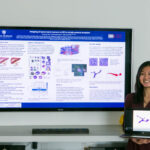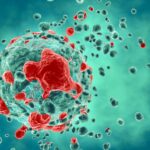Nanobio interns begin work in Hopkins labs
This week, 14 students from universities across the country began 10 weeks of laboratory work as part of the Johns Hopkins Institute for Nanobiotechnology (INBT) Research Experience for Undergraduates (REU) program. The National Science Foundation (NSF) funded REU is supported and administered by INBT.
This is the fourth year INBT has hosted REU students, which pairs undergraduates with faculty, graduate students and postdoctoral fellows in laboratories across the Hopkins campuses. At the end of their research experience, students present their findings at a university-wide collaborative research poster session held with other summer interns from across several divisions. They also have a better understanding of what it takes to be a full-time academic researcher.
Although all students are working in INBT affiliated laboratories, five students involved in the REU this summer will be specifically conducting research as part of Johns Hopkins Physical Sciences-Oncology Center (PS-OC). The PS-OC, also known as Johns Hopkins Enginering in Oncology Center, emphasizes the use of the physical sciences in the study of the spread and development of cancer. Three students will work in labs associated with the Center of Cancer Nanotechnology Excellence (CCNE)
Another goal of the NSF-based program is to encourage students from under represented groups, such as women and minorities, to follow career paths that include academic science or engineering research. INBT’s nanobio REU has been particularly popular, attracting several hundred applications to its highly competitive program each year.
Story and photos by Mary Spiro
Latest Posts
-
 Q&A with PSON Intern Jocelyn Hsu
August 19, 2021
Q&A with PSON Intern Jocelyn Hsu
August 19, 2021
-
 Start Up Founders from Johns Hopkins Aim to Stop Spread of Cancer
August 3, 2021
Start Up Founders from Johns Hopkins Aim to Stop Spread of Cancer
August 3, 2021
-
 Protein Appears to Prevent Tumor Cells from Spreading Via Blood Vessels
July 15, 2021
Protein Appears to Prevent Tumor Cells from Spreading Via Blood Vessels
July 15, 2021


